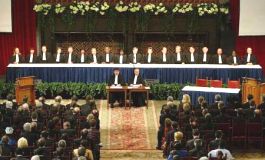Court gathers proof on Sudan war crimes
By ANTHONY DEUTSCH, Associated Press Writer
THE HAGUE, Netherlands, Apr 01, 2005 (AP) — The chief prosecutors of the International Criminal Court began gathering evidence Friday on war crimes in Sudan’s Darfur region, putting teeth in a U.N. Security Council resolution to refer suspects to the fledgling tribunal.

|
|
Inaugural ceremony of International Criminal Court in The Hague, March 11, 2003. (Reuters). |
But in Sudan’s capital, Khartoum, hard-liners vowed to defy the resolution and not work with the court, saying it was unfair for Sudanese suspects to face The Hague tribunal when Americans were exempted by the Security Council.
“We will not allow any arrest or trial of a Sudanese official,’ said Abdul Galeel Nazeer Karori, a member of Sudan’s ruling National Congress party. “This is a direct intervention in the affairs of the country.”
Some 51 suspects have been identified by a special U.N. commission of inquiry sent to Sudan to assess human rights abuses.
Some two dozen court investigators are to fly to Sudan shortly to begin preparing charges against alleged perpetrators of human rights violations, and possibly genocide, a tribunal official said.
Chief Prosecutor Luis Moreno-Ocampo wrote U.N. High Commissioner for Human Rights Louise Arbour on Friday requesting thousands of pages of potential evidence collected by the U.N. inquiry commission.
Before launching a formal investigation, Moreno-Ocampo must analyze whether the case meets the 3-year-old court’s requirements for jurisdiction.
International jurists welcomed the council resolution giving the court a case. Thursday’s resolution places the tribunal at the center of a conflict the United Natioos says has cost 180,000 lives since October 2003.
The permanent court was established to prosecute individual perpetrators of war crimes, crimes against humanity and genocide committed after its creation in July 2002, but it has not tried a single case.
The Darfur case could put the new court firmly on the map of international justice and clear the way for more cases referred by the United Nations, said Richard Goldstone, the first prosecutor at the U.N. tribunal for Rwanda and the former Yugoslavia.
Goldstone called Thursday’s vote “a huge boost,” but said it shouldn’t been seen as a change in Washington’s overall position.
The United States is not a party to the International Criminal Court, fearing the court would become a political tool for its enemies.
Washington allowed the Darfur case to go ahead only after receiving guarantees that citizens of countries not party to the court working in Sudan would not be handed over to either the international court or any other nation’s courts if they commit crimes in Sudan.
The western Sudanese region of Darfur has been the scene of one of the world’s worst humanitarian crises. A brutal counterinsurgency campaign led by government-supported Arab militias against black African farmers — and the resulting humanitarian catastrophe — has left tens of thousands dead since February 2003.
